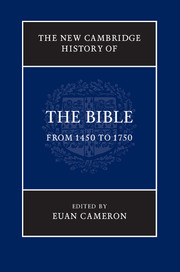Book contents
- Frontmatter
- Contents
- List of figures
- List of contributors
- Preface
- List of abbreviations
- Introduction
- PART I RETRIEVING AND EDITING THE TEXT IN EARLY MODERN EUROPE
- 1 The study of tongues: The Semitic languages and the Bible in the Renaissance
- 2 The revival of Greek studies in the West
- 3 Humanist Bible controversies
- 4 The Old Testament and its ancient versions in manuscript and print in the West, from c. 1480 to c. 1780
- 5 Critical editions of the New Testament, and the development of text-critical methods: From Erasmus to Griesbach (1516–1807)
- 6 In search of the most perfect text: The early modern printed Polyglot Bibles from Alcalá (1510–1520) to Brian Walton (1654–1658)
- PART II PRODUCING AND DISSEMINATING THE BIBLE IN TRANSLATION
- PART III PROCESSING THE BIBLE: COMMENTARY, CATECHESIS, LITURGY
- PART IV THE BIBLE IN THE BROADER CULTURE
- PART V BEYOND EUROPE
- Afterword
- Select bibliography
- Select Bible bibliography
- Index
3 - Humanist Bible controversies
from PART I - RETRIEVING AND EDITING THE TEXT IN EARLY MODERN EUROPE
Published online by Cambridge University Press: 05 August 2016
- Frontmatter
- Contents
- List of figures
- List of contributors
- Preface
- List of abbreviations
- Introduction
- PART I RETRIEVING AND EDITING THE TEXT IN EARLY MODERN EUROPE
- 1 The study of tongues: The Semitic languages and the Bible in the Renaissance
- 2 The revival of Greek studies in the West
- 3 Humanist Bible controversies
- 4 The Old Testament and its ancient versions in manuscript and print in the West, from c. 1480 to c. 1780
- 5 Critical editions of the New Testament, and the development of text-critical methods: From Erasmus to Griesbach (1516–1807)
- 6 In search of the most perfect text: The early modern printed Polyglot Bibles from Alcalá (1510–1520) to Brian Walton (1654–1658)
- PART II PRODUCING AND DISSEMINATING THE BIBLE IN TRANSLATION
- PART III PROCESSING THE BIBLE: COMMENTARY, CATECHESIS, LITURGY
- PART IV THE BIBLE IN THE BROADER CULTURE
- PART V BEYOND EUROPE
- Afterword
- Select bibliography
- Select Bible bibliography
- Index
Summary
The application of humanist scholarship to the Bible has often been reckoned among the ‘causes’ of the Reformation. A teleological dialectic that set obscurantist scholasticism in opposition to progressive humanism furnished much twentieth-century historiography with a convenient perspective in which to place both Luther's emergence and the hostile reaction to his ideas. Nor was this without a pedigree: the quip ‘Erasmus laid the eggs that Luther hatched’ was coined in the 1520s, and the narrowing orthodoxies of the Counter-Reformation squeezed Erasmian ideas out of the church to which he steadfastly professed allegiance. As so often, however, hindsight is a poor guide. Humanist biblical scholarship before the Reformation was neither a crescendo of theological provocation nor the subject of intense controversy, though it did arouse occasional disquiet. What made humanist biblical scholarship controversial was the Reformation crisis itself, which changed both the immediate and the historical perspective on the humanist, and especially the Erasmian, scriptural project. Luther, in making theology the stuff of popular controversy, dragged biblical philology into the public arena as well. In those turbulent years it was not just scholastics but also humanists who could find themselves troubled by the challenges that humanist scholarship could pose to traditional theology.
The Italian prelude
A common but misleading distinction used to be drawn between the ‘Renaissance humanism’ of Italy – pagan, epicurean and shallow – and the ‘Northern humanism’ that later flourished beyond the Alps – Christian, austere and profound. The pioneering work of Charles Trinkaus, followed up since by many other scholars, has done much to dispel this traditional misapprehension, although its long shadow continues to stretch over the subject. But as Trinkaus argued, early ‘humanism’ was Christian: humanist scholars in fifteenth-century Italy applied themselves and their critical techniques to early Christian as well as to classical literature, and to scriptural as well as to patristic texts.
The first Italian scholar to bring the techniques of humanist philology to bear upon the sacred texts was that most original and influential figure, Lorenzo Valla. In Lent 1443, while working at the court of Naples, he began making a systematic comparison of the Latin of the Vulgate New Testament with what he revealingly termed the Graeca veritas (by analogy with the established term Hebraica veritas for the Hebrew Old Testament).
- Type
- Chapter
- Information
- The New Cambridge History of the Bible , pp. 61 - 81Publisher: Cambridge University PressPrint publication year: 2016
- 2
- Cited by

